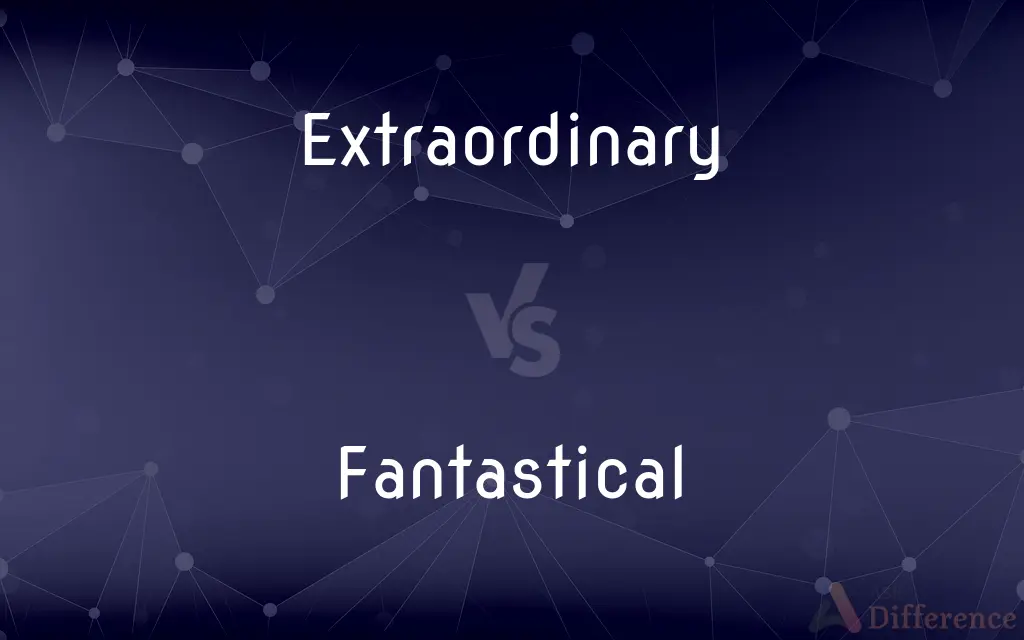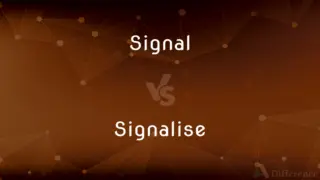Extraordinary vs. Fantastical — What's the Difference?
Edited by Tayyaba Rehman — By Fiza Rafique — Updated on May 18, 2024
Extraordinary refers to something very unusual or remarkable, while fantastical describes something imaginative or based on fantasy.

Difference Between Extraordinary and Fantastical
Table of Contents
ADVERTISEMENT
Key Differences
Extraordinary is used to describe something that stands out due to its remarkable nature. It often implies a positive connotation, highlighting achievements or events that are significantly above the norm. For example, an extraordinary talent refers to an exceptional skill set. Fantastical, on the other hand, refers to things that are imaginative or derived from fantasy. It is often used in contexts related to fiction or mythical scenarios. For instance, a fantastical story involves elements of magic or otherworldly phenomena, making it more about creative imagination than reality.
Extraordinary experiences are rooted in real life but are noteworthy because they are rare or impressive. These experiences could include extraordinary acts of kindness or extraordinary natural events. In contrast, fantastical experiences are more about the surreal and whimsical, often found in literature, movies, or art that explore magical realms.
While extraordinary can be used in formal or everyday language to describe real events or achievements, fantastical is more commonly used in artistic or literary contexts to evoke a sense of wonder or the impossible. This makes fantastical less common in practical day-to-day conversation.
Comparison Chart
Definition
Very unusual or remarkable
Imaginative or based on fantasy
Usage Context
Real life, achievements, rare events
Fiction, fantasy, mythical scenarios
ADVERTISEMENT
Connotation
Positive, impressive
Whimsical, surreal
Language Level
Formal, everyday
Artistic, literary
Example Phrase
Extraordinary talent
Fantastical story
Compare with Definitions
Extraordinary
Very unusual or remarkable.
She showed extraordinary bravery during the rescue.
Fantastical
Imaginative or based on fantasy.
The novel is filled with fantastical creatures.
Extraordinary
Noteworthy for being exceptional.
His extraordinary performance won him the award.
Fantastical
Extraordinary in an imaginative way.
The movie depicted a fantastical world.
Extraordinary
Remarkable in a positive way.
The scientist made an extraordinary discovery.
Fantastical
Unrealistic or improbable.
His explanation sounded too fantastical to be true.
Extraordinary
Going beyond what is usual or regular.
The chef prepared an extraordinary meal for the guests.
Fantastical
Relating to fantasy fiction.
She enjoys writing fantastical stories.
Extraordinary
Surpassing the ordinary.
The athlete's skills are extraordinary.
Fantastical
Based on or existing only in fantasy; unreal
Fantastic mythological creatures.
The fantastic realms of science fiction.
Extraordinary
Very unusual or remarkable
It is extraordinary that no consultation took place
The extraordinary plumage of the male
Fantastical
Strange or fanciful in form, conception, or appearance
“The fire assumed fantastic shapes as he watched” (Ward Just).
Extraordinary
(of a meeting) specially convened
An extraordinary session of the Congress
Fantastical
Unrealistic; irrational
“the early jubilant years of the Restoration with their fantastic hopes of a Golden Age and incorruptible power” (Janet Todd).
Extraordinary
An item in a company's accounts not arising from its normal activities.
Fantastical
Exceedingly great in size or degree; extravagant
A fantastic sum of money.
Extraordinary
Beyond what is ordinary or usual
Extraordinary authority.
Fantastical
Wonderful or superb; remarkable
A fantastic trip to Europe.
Extraordinary
Highly exceptional; remarkable
An extraordinary achievement.
Fantastical
An eccentric person.
Extraordinary
Employed or used for a special service, function, or occasion
A minister extraordinary.
An extraordinary professor.
Fantastical
Of or pertaining to fantasy.
Extraordinary
Not ordinary; exceptional; unusual.
Fantastical
Fanciful or whimsical.
Extraordinary
Remarkably good.
An extraordinary poet
Fantastical
Fantastic.
Extraordinary
Special or supernumerary.
The physician extraordinary in a royal household
An extraordinary professor in a German university
Fantastical
Fanciful; unreal; whimsical; capricious; fantastic.
Extraordinary
Anything that goes beyond what is ordinary.
Fantastical
Existing in fancy only;
Fantastic figures with bulbous heads the circumference of a bushel
Extraordinary
Beyond or out of the common order or method; not usual, customary, regular, or ordinary; as, extraordinary evils; extraordinary remedies.
Which disposeTo something extraordinary my thoughts.
Fantastical
Ludicrously odd;
Hamlet's assumed antic disposition
Fantastic Halloween costumes
A grotesque reflection in the mirror
Extraordinary
Exceeding the common degree, measure. or condition; hence, remarkable; uncommon; rare; wonderful; as, extraordinary talents or grandeur.
Fantastical
Surreal or whimsical.
The artist's work has a fantastical quality.
Extraordinary
Employed or sent upon an unusual or special service; as, an ambassador extraordinary.
Extraordinary
That which is extraordinary; - used especially in the plural; as, extraordinaries excepted, there is nothing to prevent success.
Their extraordinary did consist especially in the matter of prayers and devotions.
Extraordinary
Beyond what is ordinary or usual; highly unusual or exceptional or remarkable;
Extraordinary authority
An extraordinary achievement
Her extraordinary beauty
Enjoyed extraordinary popularity
An extraordinary capacity for work
An extraordinary session of the legislature
Extraordinary
Far more than usual or expected;
An extraordinary desire for approval
It was an over-the-top experience
Extraordinary
(of an official) serving an unusual or special function in addition to those of the regular officials;
An ambassador extraordinary
Common Curiosities
How is fantastical used in literature?
Fantastical is used to describe elements that are imaginative or based on fantasy.
Are extraordinary and fantastical synonyms?
No, extraordinary refers to remarkable real-life events, while fantastical refers to imaginative or fantasy elements.
Can extraordinary describe negative events?
Yes, extraordinary can describe both positive and negative events, as long as they are remarkable.
Is fantastical commonly used in everyday language?
No, fantastical is more often used in artistic or literary contexts.
Can a real event be described as fantastical?
Typically, fantastical is reserved for imaginative or surreal descriptions, not real events.
What is a fantastical element in a story?
A fantastical element includes magical creatures or otherworldly settings.
What does extraordinary mean?
Extraordinary means very unusual or remarkable.
Are extraordinary events common?
No, extraordinary events are rare and notable.
Is fantastical always positive?
Fantastical is generally neutral but can evoke a sense of wonder or whimsy.
Does fantastical imply impossibility?
Fantastical often implies elements that are improbable or surreal.
How can I use extraordinary in a sentence?
e.g., Her extraordinary achievements were recognized globally.
What type of fiction is described as fantastical?
Fiction that involves fantasy, magic, or surreal elements is described as fantastical.
Can you describe an extraordinary person?
An extraordinary person is someone who is exceptionally talented or remarkable in some way.
What is the tone of a fantastical narrative?
A fantastical narrative often has a whimsical or imaginative tone.
Can extraordinary be used formally?
Yes, extraordinary is appropriate for both formal and informal usage.
Share Your Discovery

Previous Comparison
Signal vs. Signalise
Next Comparison
Technician vs. AnalystAuthor Spotlight
Written by
Fiza RafiqueFiza Rafique is a skilled content writer at AskDifference.com, where she meticulously refines and enhances written pieces. Drawing from her vast editorial expertise, Fiza ensures clarity, accuracy, and precision in every article. Passionate about language, she continually seeks to elevate the quality of content for readers worldwide.
Edited by
Tayyaba RehmanTayyaba Rehman is a distinguished writer, currently serving as a primary contributor to askdifference.com. As a researcher in semantics and etymology, Tayyaba's passion for the complexity of languages and their distinctions has found a perfect home on the platform. Tayyaba delves into the intricacies of language, distinguishing between commonly confused words and phrases, thereby providing clarity for readers worldwide.
















































